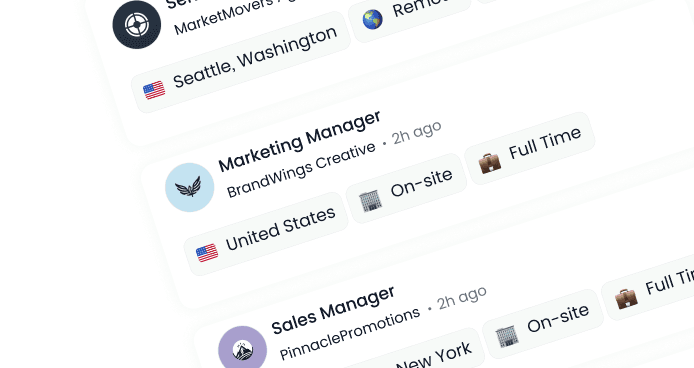How AI Improves the Screening Process for Job Postings
Published:
October 3, 2025
All
AI Recruitment
Recruiting Tips
Employer Branding
Workforce Planning
Candidate Experience
Smarter screening, stronger hires — see how AI is reshaping job posting evaluations.
Rethinking How We Screen Resumes
It’s no surprise that, given today’s competitive job market, employers receive a large number of applications for every job posting. In fact according to Glassdoor, the average corporate job ad receives around 250 resumes, yet only 4 to 6 candidates make it to the interview stage. Going through and processing such a volume of applications is a laborious process and it is also extremely time-consuming.
The problem is when recruiters are so overwhelmed with repetitive and laborious tasks, the chances of missing out on the right candidates goes up. However, thanks to recent developments in AI, it is possible to hand over admin tasks to this technology. That allows recruiters to take on their actual role of building rapport and carrying out decision making.
The above is just one aspect of how AI improves the screening process for job postings. In this blog we’ll be looking at the challenges of the traditional screening. We will also look at how AI can improve upon it and practical steps for implementation among other aspects. So without further ado, let’s begin.
The Challenge of Traditional Screening
As mentioned previously, sifting through a large volume of applications is labor and time intensive. The problem with this is that there is pressure on the hiring team to find a resource as soon as possible. This can result in bias creeping in, which can cause hasty decisions to be made and proper filtering to be overlooked.
At the same time, if you’re looking to scale your hiring operations the traditional screening methods are extremely inefficient; it will require a lot of resources to scale. If you have a large applicant pool going into the thousands or more, the cost associated with it would make the entire process not feasible. Besides the cost, the resultant increase in hiring time, hiring team stress and fatigue and increases the chance of missing out on top talent, making the entire manual screening process inefficient.
The answer to the challenges facing the manual screening method, is automation specifically AI-powered automation. That is what we’ll be looking at next.
How AI Improves the Screening Process
The area where AI offers the most benefit is in screening-related tasks. The tasks specifically of scanning and sifting through hundreds if not thousands of resumes in minimum time. It utilizes advanced algorithms to search out candidates having the required skill set, experience and expertise for a specific advertised role and highlight such applicants within minutes.
Furthermore, the following benefits are part and parcel of AI usage:
Screening at Scale
Speed is the most powerful benefit of AI-powered screening systems. This aspect is most apparent when it comes to scaling. Sifting through hundreds or even thousands of applications, which would result in weeks of work for the hiring team, can be done by AI in a matter of minutes. The automated system can score and rank candidates in minimum time and since there is no human factor involved, no application gets skipped or falls prey to unconscious bias.
Bias Reduction in Screening
We touched upon unconscious bias, in our previous section. The fact is that AI has the ability to filter out such bias that might be caused by human factors. Including fatigue, stress and rushing to get the job done. Plus since it focuses on points including skill, expertise, and experience depending on given requirements. This can result in more diverse hiring, since things like bias related to gender, ethnic background, or being a graduate of a specific school are not taken into consideration.
Data-Driven Hiring Decisions
Also, AI utilizes analytics. It looks at an applicant’s previous work, which includes performance and factors that predict success. What this translates to is that AI focuses on data-driven results to select and highlight talented individuals. This ensures that hiring teams don’t have to follow gut instinct, they can rely on solid data backed insights during interviews and when making an offer.
Next, let us look at some applications of AI.
Applications of AI
Contrary to what some say, many organizations have already adopted AI in the recruitment process:
Resume parsing software extracts information in an organized way and does so much faster than manual processing.
Communication with candidates via AI-powered agents that answer FAQs and pre-qualify applicants.
Video-based interviews allow asynchronous screening, saving time across time zones.
The AI-based applicant tracking systems filter out applicants who don’t meet predetermined criteria.
Platforms such as DigitalHire, for instance, leverage AI-powered technologies such as pre-recorded video interviews and automated resume matching to simplify the shortlisting process. These capabilities demonstrate how technology can make it easier to hire without having to put human decision-making aside.
Practical Steps To Get Started
For organizations who may be thinking of implementing AI screening tools, here are some actionable steps:
Be clear about the screening criteria to ensure that tools match role requirements.
Audit AI outputs on a regular basis to keep track of fairness and reduce bias.
Train recruiters to efficiently interpret and use AI recommendations.
Start small with one function—such as resume parsing or scheduling—then scale up.
Comply with changing laws such as the EU AI Act or U.S. Department of Labor guidance on inclusive hiring.
By adhering to the above steps, HRs can introduce AI in a controlled manner to ensure compliance and positive outcomes.
AI Prospect for the Future
The AI screening tools will keep on improving as more people use them. We're already seeing AI assistants that can reach out to candidates, schedule interviews, and provide predictive insights regarding long-term job fit. The second step will probably be a further level of integration with collaboration tools, providing hiring teams with a single picture of any applicant.
Recruiters that leverage AI now will not only gain efficiency but will future-proof their hiring processes from increasingly fierce competition and regulation demands.
In Conclusion
As we reach the end of this blog post, let us summarize how AI improves the screening process for job postings. From allowing faster initial screenings as compared to the manual sifting of applications to reducing bias and ensuring that decisions are more data-driven. All these offer major benefits to recruiters. AI allows them to focus on the human aspect of building rapport and making sound decisions based on provided data.
Are you ready to cut down on screening time and find top talent for your advertised position? See how AI can help you scale your hiring efforts and streamline your recruitment process with DigitalHire.
FREE JOB POST
Looking to fill a position quickly? Post your job for free and reach top talent today!




